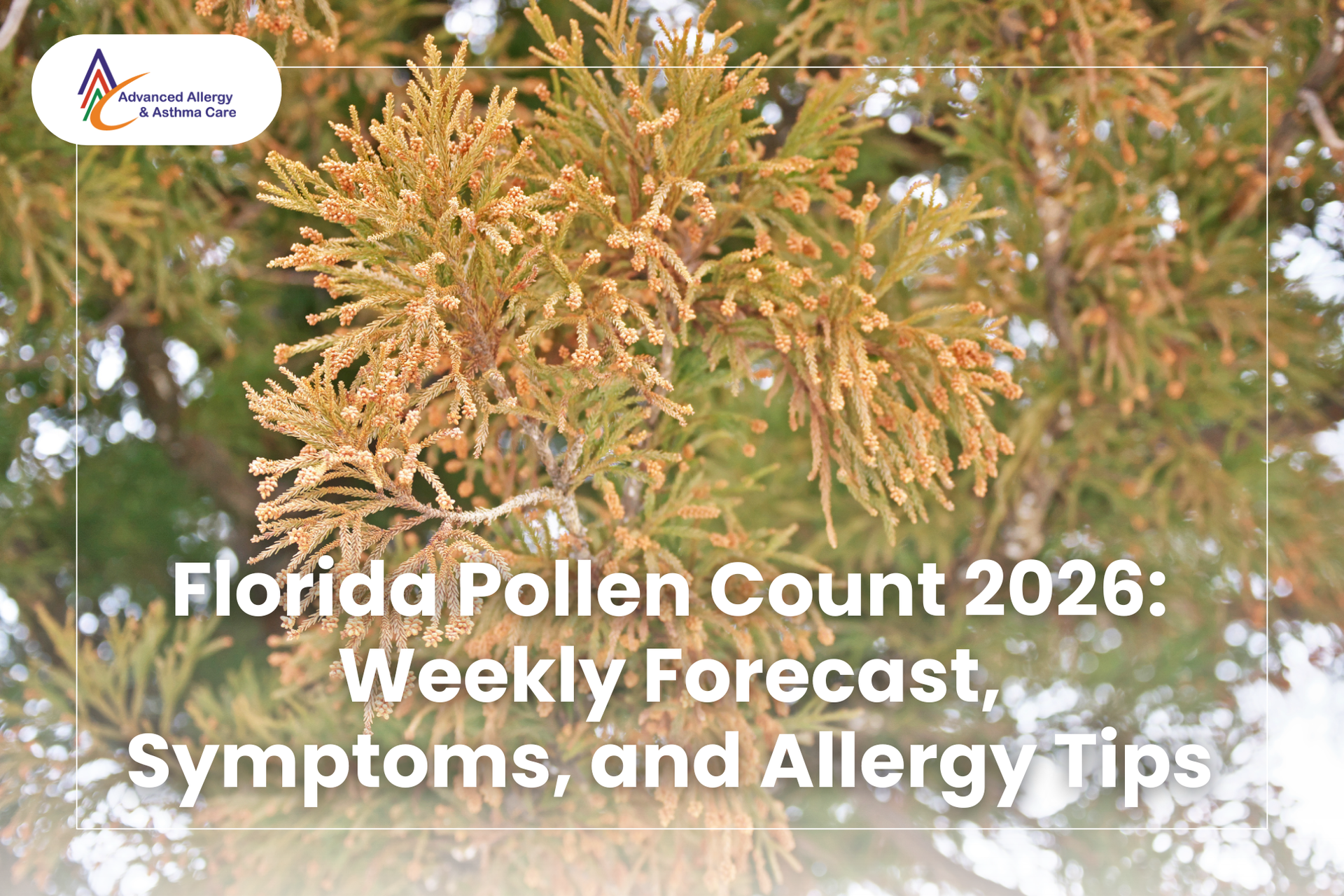Looking for Severe Asthma Treatment This Summer? Biologics May Help

Every year, many asthma patients find themselves asking the same question: “Why does my asthma get worse in the summer?”
While the hot season brings sunshine, longer days, and more time outdoors, it can also trigger frequent heat-induced asthma symptoms. The heat, humidity, allergens, and pollution in summer can make breathing more difficult, especially for those with moderate to severe asthma.
Luckily, advancements in medicine have brought biologics for asthma, changing the way specialists manage difficult-to-control symptoms. These targeted
severe asthma treatments address the underlying immune responses that drive the flare-ups, offering hope for patients who continue to struggle despite using inhalers or steroids.
In this blog, we’ll explore different summer asthma management strategies and how biologics may benefit those with severe symptoms.
Find Relief from Heat-Induced Asthma Symptoms
Why Summer Makes Asthma Worse
Before exploring biologic therapies, it helps to understand why asthma gets worse in the summer.
Here are a few reasons asthma and hot weather don’t mix well:
Heat and Humidity Tighten Airways
Hot, sticky air makes breathing feel heavier and can increase airway inflammation. For many patients, this leads to wheezing, coughing, and shortness of breath.
Pollen, Dust, and Mold Counts Rise
Summer plants and grasses release more pollen, while mold thrives in warm, humid environments. Outdoor activities also stir up dust, all of which can trigger asthma flare-ups.
High Ozone Levels Worsen Symptoms
Pollution tends to rise in hot weather. Ground-level ozone, formed when heat and sunlight mix with emissions, irritates sensitive airways and can send asthma patients to the emergency room.
Allergen Exposure Increases with Outdoor Activity
From hiking to sports, people spend more time outside in the summer. Outside activities combined with allergens and heat can increase the risk of an asthma attack.
Biologic Therapy for Asthma Explained
For decades, asthma treatment has relied on inhaled corticosteroids, bronchodilators, and oral steroids. While these therapies help many patients, they aren’t always enough for those with severe or uncontrolled asthma.
That’s where
biologics for asthma make a difference. These targeted treatments block specific immune system pathways responsible for asthma symptoms. Instead of treating all inflammation, they go after the exact molecules — like IgE, IL-5, or IL-4 — that trigger severe asthma attacks.
Who Can Benefit from Biologics for Asthma?
Biologics are usually prescribed for patients who have:
- Severe asthma not controlled by standard inhalers or steroids.
- Frequent ER visits or hospitalizations due to asthma.
- High steroid dependence.
Examples of Biologic Therapies for Asthma
Some commonly prescribed biologics include:
- Dupixent (dupilumab)
- Fasenra (benralizumab)
- Nucala (mepolizumab)
- Xolair (omalizumab)
These treatments are administered by injection, either in a clinic or sometimes at home, and are tailored to the patient’s specific type of asthma.
How Biologics Help Manage Asthma in Hot Weather
Summer is one of the hardest times of the year for many people with asthma. The combination of heat, humidity, pollen, and air pollution can overwhelm the airways, making symptoms worse and increasing the chance of severe flare-ups.
If your asthma tends to spike in the summer months, biologic therapies may offer the extra support you need. Let’s break down the key ways biologic therapies help with summer asthma management.
Reduced Inflammation and Allergic Responses
Biologics work by calming the immune system and blocking the pathways that drive airway inflammation. This targeted approach means less swelling, less mucus, and fewer heat-induced asthma symptoms.
Lower Sensitivity to Summer Asthma Triggers
For many patients, biologics reduce the body’s overreaction to common summer irritants like pollen, mold, dust, and ozone. That makes it easier to spend time outdoors without constantly worrying about an asthma attack.
Reduced ER Visits and Hospitalizations
One of the most important benefits of biologics for allergic asthma is their ability to prevent severe, life-threatening asthma attacks. Studies have shown that patients receiving biologic therapy experience significantly fewer ER visits and hospital stays — even during peak summer heat waves, when complications tend to rise.
Is Biologic Therapy Right for You?
Biologics aren’t necessary for every asthma patient, but for those with severe or uncontrolled asthma, they can be life-changing. Biologic therapy for asthma is designed for people whose symptoms remain difficult to manage despite using standard treatments like inhalers or steroids.
You may be a good candidate for biologic treatments if you:
- Continue to have frequent asthma attacks even while taking daily controller medications.
- Depend on oral steroids to keep symptoms under control.
- Don’t get enough relief from standard inhalers or experience side effects that limit their use.
- Have required urgent care or hospital visits because of asthma flare-ups.
- Live with allergy-related or eosinophilic asthma that hasn’t improved with traditional therapies.
Proven Tips for Effective Summer Asthma Management
While biologic therapies can greatly improve asthma control, daily habits still play an important role in keeping symptoms at bay during the summer. Simple lifestyle adjustments can make a big difference in how well you manage flare-ups.
Here are some summer asthma management strategies to keep in mind:
- Stay indoors during peak heat
– Avoid going outside between noon and 5 p.m. when ozone and temperatures are highest.
- Use HEPA filters and air conditioning
– Keep your indoor air cool, dry, and clean. AC units filter out pollen and help reduce humidity that fuels mold growth.
- Avoid known allergens
– If grass, pollen, or mold trigger your symptoms, limit outdoor exposure, especially after lawn mowing or rainstorms.
- Stay hydrated
– Drink plenty of water to thin mucus and keep airways less irritated.
- Avoid smoke and pollution – Steer clear of campfires, fireworks, cigarette smoke, and urban smog, all of which can worsen asthma symptoms.
Keep Asthma from Spoiling Summer Fun with the Help of Advanced Allergy and Asthma Care

For many people with asthma, summer often feels like the season of limits—staying indoors when it’s sunny, skipping outings with friends, or planning life around flare-ups. But it doesn’t have to stay that way.
Biologics for asthma are changing what’s possible for patients with severe symptoms. Instead of simply masking inflammation, they go straight to the source, targeting the immune pathways that trigger asthma attacks. That means fewer flare-ups, less dependence on oral steroids, and more freedom to enjoy the things you’ve been missing.
If your current treatment isn’t giving you the relief you need, you don’t have to keep pushing through another difficult season. Schedule a consultation with
Advanced Allergy and Asthma Care to find out if biologics are right for you.
Explore Biologics Therapy for Asthma Attacks
Frequently Asked Questions
Will I still need to use my inhaler if I start biologics?
Biologic therapies for asthma don’t replace quick-relief inhalers, but they often reduce how often you need them. Many of our patients report fewer flare-ups and less dependence on rescue inhalers once they begin biologic therapy.
How long does it take for biologics to start working?
The timeline varies from patient to patient. Some see improvements within weeks, while others may take a few months. At Advanced Allergy and Asthma Care, we closely monitor your progress and adjust your treatment plan as needed.
Can children or teens use biologics for asthma?
Yes, some biologics are FDA-approved for children as young as 6 years old. If your child struggles with uncontrolled asthma, our specialists can determine if biologics are an appropriate option.
Will insurance cover biologics for asthma treatment?
Most insurance providers do cover biologics if you meet medical criteria for severe or uncontrolled asthma. Our team at Advanced Allergy and Asthma Care will help navigate prior authorizations and paperwork so you can focus on feeling better.








